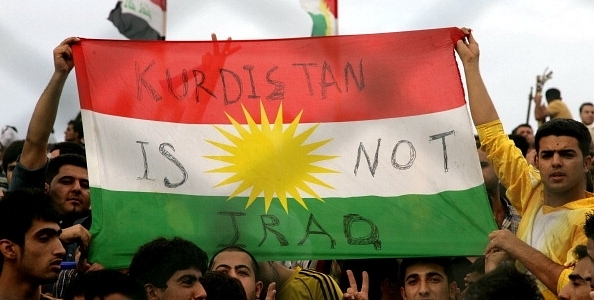Insta
Tensions Rise As Iraqi Kurdistan Defies Baghdad With Independence Vote

Iraqi Kurdish football fans holding a Kurdistan flag. SAFIN HAMED/AFP/Getty Images)
Iraq's Kurds defied widespread opposition to vote in a historic independence referendum, sparking fresh tensions with Baghdad, threats from Turkey and fears of unrest. The vote in the autonomous Kurdish region of northern Iraq and some disputed areas is non-binding and will not lead automatically to independence, but is seen by the Kurds as a major step towards a long-cherished dream of statehood.
Voters flocked to the polls, eager to show off their ink-stained fingers after casting their ballots, and an overwhelming "Yes" outcome is expected.
The vote took place peacefully and in a festive atmosphere, but signs of potential trouble mounted as the day progressed.
In New York, UN chief Antonio Guterres expressed concern about the "potentially destabilising effects" of the referendum. Expressing respect for "the sovereignty, territorial integrity and unity of Iraq", he called for differences to be resolved through "structured dialogue and constructive compromise".
Lawmakers in Baghdad, which has declared the vote unconstitutional, demanded the government send troops to disputed areas where the referendum was taking place. In Istanbul, President Recep Tayyip Erdogan warned that Turkey – which fears the effects of the vote on its own sizeable Kurdish population – would shut its border with Iraqi Kurdistan and threatened to block key exports. And in Kirkuk, a disputed city where the vote controversially went ahead, security forces deployed on the streets after a curfew was imposed in parts of the city.
Soon after voting began in the Iraqi Kurdish capital Arbil, many men headed to polling stations dressed in traditional Kurdish dress of brown shirt and billowing trousers.
Veteran Iraqi Kurd leader Massud Barzani, who initiated the vote, smiled as he cast his ballot early in the morning, wearing a traditional headscarf. He pushed ahead with the referendum despite the opposition from Baghdad and Ankara, but also from Iran which has its own large Kurdish minority, and Western countries who fear the vote could hamper the fight against the Islamic State (IS) jihadist group in which cooperation between Baghdad and the Kurds has been key.
Polling stations were scattered across the three northern provinces of autonomous Iraqi Kurdistan – Arbil, Sulaimaniyah and Dohuk – as well as in disputed border zones such as the oil-rich province of Kirkuk. A total of 12,072 polling stations were open for more than 5.3 million registered voters.
As voting progressed, Iraq's parliament ordered Prime Minister Haider al-Abadi to "deploy forces" in areas disputed with the Kurds. Asked about the risks of armed conflict, Abadi's spokesman Saad al-Hadithi told AFP: "If there are clashes in these zones, it will be the job of federal forces to apply the law."
Abadi on Sunday pledged to take all the "necessary measures" to protect the country's unity, as his government urged all countries to deal only with it on oil transactions.
The Iraqi Kurds export an average 600,000 barrels per day through a pipeline running through Turkey to Ceyhan on the Mediterranean. Erdogan yesterday threatened to halt these lifeline oil exports, angrily denouncing an "illegitimate" referendum. The Turkish president also said Turkey's Habur border crossing with Iraqi Kurdistan would be closed. Tehran has also increased pressure, announcing on Sunday it had blocked all flights to and from the region at Baghdad's request.
However, the referendum sparked celebrations in the Syrian Kurdish city of Qamishli, in solidarity with their brethren across the border.
Left without a state of their own when the borders of the Middle East were redrawn after World War I, the Kurds see themselves as the world's largest stateless people. The non-Arab ethnic group number between 25 and 35 million people spread across Iraq, Iran, Turkey and Syria. (PTI)
Support Swarajya's 50 Ground Reports Project & Sponsor A Story
Every general election Swarajya does a 50 ground reports project.
Aimed only at serious readers and those who appreciate the nuances of political undercurrents, the project provides a sense of India's electoral landscape. As you know, these reports are produced after considerable investment of travel, time and effort on the ground.
This time too we've kicked off the project in style and have covered over 30 constituencies already. If you're someone who appreciates such work and have enjoyed our coverage please consider sponsoring a ground report for just Rs 2999 to Rs 19,999 - it goes a long way in helping us produce more quality reportage.
You can also back this project by becoming a subscriber for as little as Rs 999 - so do click on this links and choose a plan that suits you and back us.
Click below to contribute.
Latest